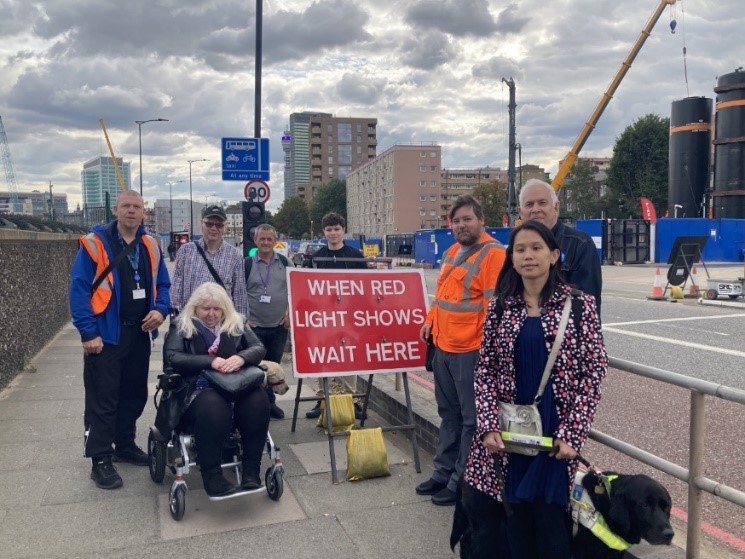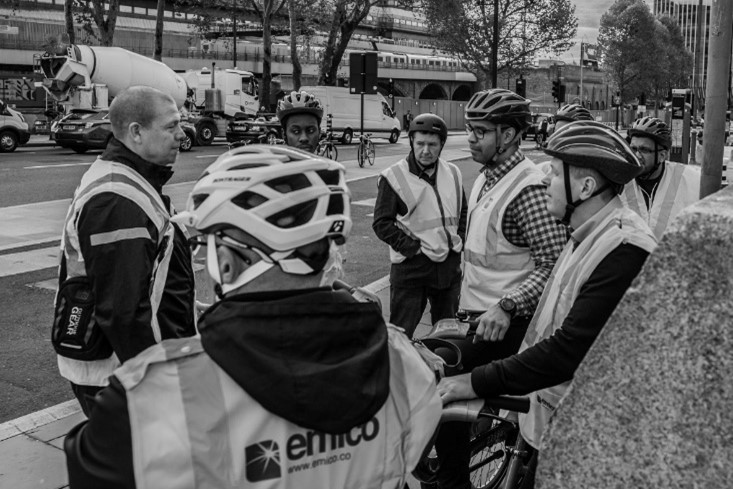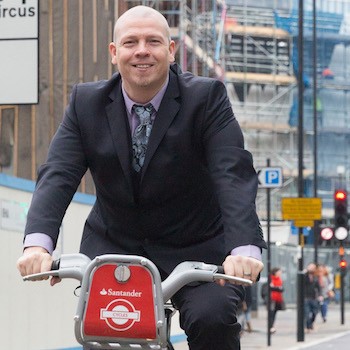
Welcome to the 8 Questions, where we ask senior figures in the sector the questions every business leader and ambitious professional wants answered. In this edition, Michael Barratt MBE, Construction, Advisory & Innovations Manager with Transport for London is asked about knowledge and skills to create inclusive transport, the ‘purple pound’ and much more.
Join other savvy professionals just like you at CIHT. We are committed to fulfilling your professional development needs throughout your career
According to Scope, there are 14.1 million disabled people in the UK which is approximately 20% of the population and 80% of those have an invisible disability. For inclusive transport projects to be successful, holistic planning is required, and for those involved have to have awareness, empathy and understanding of ‘all’ community needs.
We need to bring together designers, engineers, innovators, and inclusion specialists to supply that all-inclusive product. Therefore, to establish resilient and sustainable outcomes requires a combination of accessible, safe and cost-effective solutions highlighting the importance of collaboration and partnership. If you design for the 20%, you design for everyone!
There are environmental and economic factors that drive decision-making and we utilise statistics to justify what we do. Therefore, to highlight the benefits of supplying the all-inclusive paradigm is to highlight the additional benefits. Research on the ‘purple pound’ shows that organisations are losing out on the £274 billion spending power disabled households can supply due to poor accessibility and attitudes (This includes £42 million missed by transport providers which could mean people either choose a less sustainable mode of transport or become inactive and potentially stay at home, which has implications on health and wellbeing which significantly impacts the NHS).
Being holistic in thought is surely the most pragmatic approach to avoid this.
I’m very fortunate to have a great team to work with and a role that gets us involved with a broad range of projects and a plethora of stakeholders. My favourite part of the job is bringing people together to problem solve difficult situations whether they be community, logistical, or construction related.
When cycling wasn’t at the forefront during temporary works, the late Andy Cawdell (Southwark Cyclists) and I teamed up and co-founded the ‘Roadworks Patrol.’ We would cycle through roadworks and supply the project teams’ feedback on the cycling experience, then I would guide them on where and how to incorporate temporary cycling facilities.
This method won the John Smart Road Safety Award in 2017 and catapulted its popularity across the capital and some parts of the UK. Since then, the method has been refined into the 3 Tier Assessment which provides an alternative method of planning for all-inclusive design (walking and cycling).
Another method I’m proud to have initiated is to ‘future proof’ TfL projects. This involves installing empty ducts during the project build, funded by the Lane Rental Charges, to negate the need for future utility works thus removing potential barriers to access in advance.
Being inclusive should mean what it says - ‘inclusive!’ We have diverse communities and as such, a duty to consider everybody. Being professional within a public representative role is to supply a non-biased and considerate approach in line with policy and/or legislation. There are structured processes to follow, however, these need to be checked and re-assessed as environments change and design standards are updated over time.
To avoid assumptions, we support a number of methods that reaches out to communities to guide people on what we do and to be supplied feedback on our approach. This includes initiatives such as the Valuing People group (adults with learning disabilities), Steps into Work (supplying help with careers and understanding how to make reasonable adjustments) and the Independent Disability Advisory Group (IDAG) who audit our processes.
At TfL, as with many other organisations, project teams submit Equality Impact Assessments (EqIA) for their associated schemes during the planning/design stages which are then audited. To help with quality of response and manage resources, each EqIA audit is undertaken by one of over 20 trained internal volunteers called ‘super users’ from across the business. During this process, as per the Equality Act 2010, and if required, we highlight areas needing a bit more thought to ensure we are meeting our duty under the act with a focus on the nine protected characteristics.
Inclusive transport in professional practice should provide evidence of competency e.g., consistency, quality, continual learning and development, scrutiny, honesty and reflection. I believe we are one of the world leaders in this field.
Budget is one of the biggest barriers we are faced with. From my perspective, I would say the main issue is the ageing and often inaccessible infrastructure that requires updating. A good example is the huge programme at TfL to supply step-free access at stations.
Retrofitting can be difficult to engineer and expensive, and in order to supply inclusivity will need new and innovative approaches.
It’s important we promote these lessons learned for all future transport projects.
To focus on the construction industry, there are plenty of methods available to educate and/or challenge historic processes and cultures.
I’ve found that visual representation and community involvement the Equality Act.
We run lunch & learn presentations, accessibility forums, workshops and active experiences to the industry that helps educate and highlights what ‘barriers to access’ look like. We follow this up by guiding teams on how to consider access and inclusion within the planning stages (3 tier assessment) and involve people from the local community to give their perspective.
There are often too many assumptions and generalisations on who is impacted and a lack of understanding that not all communities are the same.
It’s about being educated by the people who face challenges every day and learning how they feel and what they have to go through that supplies empathy. This should result in having the mindset and passion to do it right.
A simple answer would be to include people who face barriers to access daily within the design and approval processes.
The active walking and cycling events we supply for many construction industry partners receive typical responses such as “That was an eye-opening experience” or “I hope we don’t cause issues like this!”
Constructors initially see these events as a novelty exercise until they get a good feel for what is actually happening on the roads and who it could impact. The aspiration is for them to commit to raise their standards of working.
The thoughts behind the 3 Tier Assessment are to supply local context within design.
By researching the area ahead of works (tier 1) gives details on who is likely to walk and cycle by your works. We encourage contractors to meet communities, engage in discussions, go out for a walk and ride with them and learn from the experience.
During design (tier 2) local considerations can then be applied using knowledge gained. When works commence to test and get feedback from the local communities (tier 3) on how they find negotiating the traffic management and if any tweaks are required to improve the experience.
This method is gaining traction across the UK with many contractors contacting us to learn more.
These events are good ways of reminding people about considering other people. The issue is that there are many similar events throughout the year with diverse topics and could cloud the memory even if very impactful at the time. It’s important to keep hold of the message, install policies and dedicate resource to ensure it is maintained.
At some construction projects we have been encouraging constructors to incorporate frontline staff champions (traffic marshals).
We supply empowerment training, find out individual’s motivators and, if the participants are willing, offer additional responsibilities such as becoming community and accessibility champions for the projects.
By recognising the value of staff not normally associated with such roles helps supply inclusion within the workforce as well as benefiting those that are impacted by the associated works. Front line staff are usually the first to see and experience issues.
When resources are constrained, there are numerous ways to try alternative approaches. If we all go above and beyond, above and beyond becomes business as usual!



The opinions expressed in this article are those of the authors. They do not purport to reflect the opinions or views of the CIHT or its members. Neither the CIHT nor any person acting on their behalf may be held responsible for the use which may be made of the information contained therein.
Sign up to the APM Newsletter.